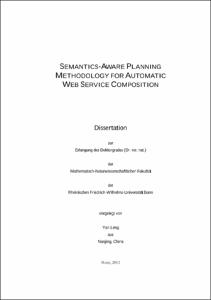Leng, Yan: Semantics-aware planning methodology for automatic web service composition. - Bonn, 2012. - Dissertation, Rheinische Friedrich-Wilhelms-Universität Bonn.
Online-Ausgabe in bonndoc: https://nbn-resolving.org/urn:nbn:de:hbz:5n-29159
Online-Ausgabe in bonndoc: https://nbn-resolving.org/urn:nbn:de:hbz:5n-29159
@phdthesis{handle:20.500.11811/5342,
urn: https://nbn-resolving.org/urn:nbn:de:hbz:5n-29159,
author = {{Yan Leng}},
title = {Semantics-aware planning methodology for automatic web service composition},
school = {Rheinische Friedrich-Wilhelms-Universität Bonn},
year = 2012,
month = jul,
note = {Service-Oriented Computing (SOC) has been a major research topic in the past years. It is based on the idea of composing distributed applications even in heterogeneous environments by discovering and invoking network-available Web Services to accomplish some complex tasks when no existing service can satisfy the user request. Service-Oriented Architecture (SOA) is a key design principle to facilitate building of these autonomous, platform-independent Web Services. However, in distributed environments, the use of services without considering their underlying semantics, either functional semantics or quality guarantees can negatively affect a composition process by raising intermittent failures or leading to slow performance.
More recently, Artificial Intelligence (AI) Planning technologies have been exploited to facilitate the automated composition. But most of the AI planning based algorithms do not scale well when the number of Web Services increases, and there is no guarantee that a solution for a composition problem will be found even if it exists. AI Planning Graph tries to address various limitations in traditional AI planning by providing a unique search space in a directed layered graph. However, the existing AI Planning Graph algorithm only focuses on finding complete solutions without taking account of other services which are not achieving the goals. It will result in the failure of creating such a graph in the case that many services are available, despite most of them being irrelevant to the goals.
This dissertation puts forward a concept of building a more intelligent planning mechanism which should be a combination of semantics-aware service selection and a goal-directed planning algorithm. Based on this concept, a new planning system so-called Semantics Enhanced web service Mining (SEwsMining) has been developed. Semantic-aware service selection is achieved by calculating on-demand multi-attributes semantics similarity based on semantic annotations (QWSMO-Lite). The planning algorithm is a substantial revision of the AI GraphPlan algorithm. To reduce the size of planning graph, a bi-directional planning strategy has been developed.},
url = {https://hdl.handle.net/20.500.11811/5342}
}
urn: https://nbn-resolving.org/urn:nbn:de:hbz:5n-29159,
author = {{Yan Leng}},
title = {Semantics-aware planning methodology for automatic web service composition},
school = {Rheinische Friedrich-Wilhelms-Universität Bonn},
year = 2012,
month = jul,
note = {Service-Oriented Computing (SOC) has been a major research topic in the past years. It is based on the idea of composing distributed applications even in heterogeneous environments by discovering and invoking network-available Web Services to accomplish some complex tasks when no existing service can satisfy the user request. Service-Oriented Architecture (SOA) is a key design principle to facilitate building of these autonomous, platform-independent Web Services. However, in distributed environments, the use of services without considering their underlying semantics, either functional semantics or quality guarantees can negatively affect a composition process by raising intermittent failures or leading to slow performance.
More recently, Artificial Intelligence (AI) Planning technologies have been exploited to facilitate the automated composition. But most of the AI planning based algorithms do not scale well when the number of Web Services increases, and there is no guarantee that a solution for a composition problem will be found even if it exists. AI Planning Graph tries to address various limitations in traditional AI planning by providing a unique search space in a directed layered graph. However, the existing AI Planning Graph algorithm only focuses on finding complete solutions without taking account of other services which are not achieving the goals. It will result in the failure of creating such a graph in the case that many services are available, despite most of them being irrelevant to the goals.
This dissertation puts forward a concept of building a more intelligent planning mechanism which should be a combination of semantics-aware service selection and a goal-directed planning algorithm. Based on this concept, a new planning system so-called Semantics Enhanced web service Mining (SEwsMining) has been developed. Semantic-aware service selection is achieved by calculating on-demand multi-attributes semantics similarity based on semantic annotations (QWSMO-Lite). The planning algorithm is a substantial revision of the AI GraphPlan algorithm. To reduce the size of planning graph, a bi-directional planning strategy has been developed.},
url = {https://hdl.handle.net/20.500.11811/5342}
}






